Congenital heart disease is the greatest killer of Australian children under one and every day in Australia eight babies are born with a heart defect.
Did you know eight children are born every day in Australia with a heart defect? Sadly, every week four precious lives are lost.
Childhood heart disease, otherwise known as CHD or congenital heart disease, remains one of the most misunderstood and misrepresented health related issues in Australia.
It is the biggest cause of death of babies under 12 months of age, yet has no known cure.
During Congenital Heart Disease Awareness Day on February 14, HeartKids is highlighting the devastating impact that congenital heart disease will have on nearly 3,000 new families who will be impacted by disease this year.
It is a lifelong disease with no known cure. It is estimated that there are approximately 64,000 children and adults living with the disease, many of who will be required to undergo ongoing heart surgeries throughout their lives.
Needless to say, families with children impacted by CHD endure enormous emotional, physical and financial challenges, particularly as their newborns are undergoing open heart surgeries and treatment.
Did you know these famous people all suffer from congenital heart disease:
• Miley Cyrus, singer and actress – Tachycardia
• Shaun White, snowboarding Olympic gold medallist – Tetralogy of Fallot
• Jessie J, singer – Wolff-Parkinson-White Syndrome
• Jimmy Barnes
Also these famous parents all have children diagnosed with congenital heart disease:
• Jimmy Kimmel, Late Night host, son with Tetralogy of Fallot with Pulmonary Artesia
• Sylvester Stallone, actor, daughter with Ventricular Septal Defect
• Katherine Heigl, actress
• Simon Reeve, Channel Seven Weekend Sunrise presenter
• Ashton Kutcher’s twin brother was born with CHD and has had a heart transplant
My story
Our first born son (now approaching age 15) was diagnosed with a Congenital heart disease called – transposition of the greater arteries.
I never once considered asking the sonographer if they had checked my son’s heart closely when we had our 20 week scan. I was a first time mum-to-be, excited and nervous about finding out whether it was a boy or girl, not giving my baby’s heart health a second thought. I trusted that the major organs were being checked closely, and believed them when they said my baby was healthy.
Imagine the shock when we found out six hours after our son’s birth that something was drastically wrong.
We were flown to Melbourne (from Tasmania) the day after our baby boy was born, where we spent the first three weeks of our newborn baby’s life, anxiously waiting to hear he was going to be OK.
I sat on the plane and sobbed. People must have thought I was crazy. I still had my hospital tag attached. I looked like I had escaped from a mental ward.
I had just become a new mum and this was NOT meant to be how things happened. Nobody had warned me that things can go wrong. Why wasn’t THIS discussed at one of my many midwife appointments?
When he was less than 24 hours old he had his first procedure, a septostomy, to improve the blood flow while we waited for his major surgery. They needed him to grow a bit before performing his open heart surgery. The heart is the size of your fist so you can imagine how tiny the heart is of a 7 lb 1 oz newborn.
Finally, when he was eight days old, he was ready for his lifesaving surgery. It was the 18th March 2004. I wasn’t brave. I refused to hand my tiny baby boy over to the surgeons. Instead, I stayed in bed and sobbed. I regret that now, but at the time I just didn’t have the strength to fight the emotion.
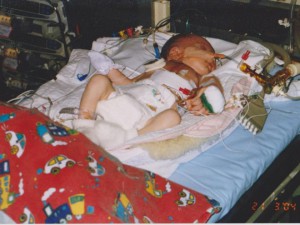
He was on heart bypass for eight hours while they performed the arterial switch operation. It was the longest eight hours of my life.
We hit a few bumps, but thankfully we are one of the lucky families with a successful outcome. Our son will be fifteen years old in a few weeks and his condition (although never cured) has never held him back from pursuing what he wants, including a very promising football career.
Children with childhood heart disease will face unique challenges for the rest of their lives and for many, this will include ongoing medical treatment and repeated heart surgeries.
Thankfully there are more people over the age of 16 with CHD than younger. This is due to medical advances. In days gone by they were the ‘blue babies’, most of whom died at birth. Thank goodness for medical advances!
Sadly, many families don’t have a happy ending to their story. Picking up a heart defect early could increase the chances of survival for some babies.
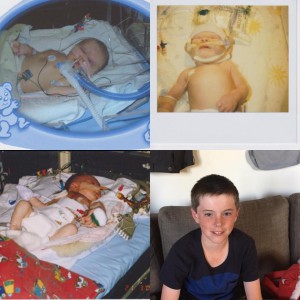
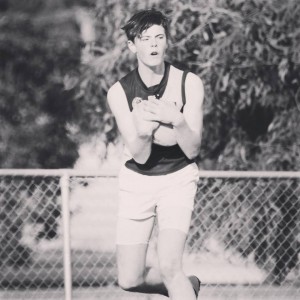
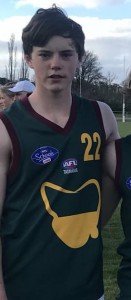
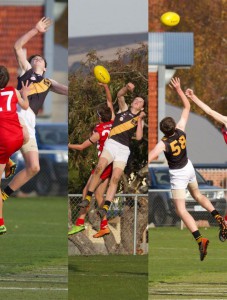
Don’t be scared to ask!
To ensure that treatment is available as soon as possible, doctors are now urging all pregnant mums to ask four simple questions about their unborn baby’s heart during the 20 week scan.
•Do you see four chambers?
•Are the major organs in the right spot?
•Is the heart rate normal?
•Is the heart functioning normally?
How to ‘Show Your Heart’ this February:
Donate at www.heartkids.org.au/showyourheart. All proceeds go directly to help HeartKids support children affected by congenital heart disease and their families.
Read more: Why I am Glad I Didn’t Know About My Sons Illness Before Birth
Share your thoughts below.
Image stock photo




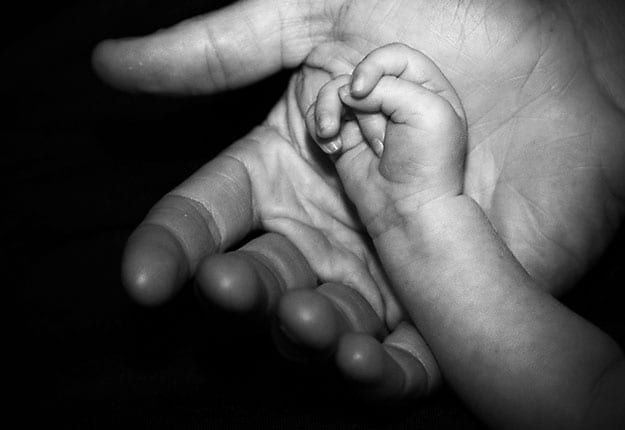
















12:24 pm
9:22 pm
6:28 am
1:30 pm
8:42 pm
9:08 am
4:46 pm
2:25 pm
8:34 pm
11:04 am
5:50 am
-

-
-
mom93821 replied
- 19 Jan 2019 , 11:20 am
Reply4:03 am
11:47 pm
11:31 pm
10:57 pm
8:16 pm
7:48 pm
7:47 pm
5:29 pm
3:36 pm
- 1
- 2
- 3
- »
Post a commentTo post a review/comment please join us or login so we can allocate your points.